 To date, most ADSL equipment that BT has put out has been pretty …. functional … or put another way, ugly. Their ethernet routers have been transposed from office equipment, and their USB kit, the Frog as it was known … well don’t get us started on that*.
To date, most ADSL equipment that BT has put out has been pretty …. functional … or put another way, ugly. Their ethernet routers have been transposed from office equipment, and their USB kit, the Frog as it was known … well don’t get us started on that*.
This has all changed with their latest packaging of broadband. Released alongside this, the newly-announced BT WiFi Home Hub has been designed to seduce people into pulling their router out from it previous position in the study or under the stairs, and putting it in to their living space.
Why would they care about that? Well it’s important for the success of products like BT Vision, their autumn-release IPTV service, as the connection between the Home Hub and the BT Vision box currently has to be wired ethernet. Given most people don’t have their house cabled for ethernet, the Home Hub has to be located close to the main TV in the house, normally in the lounge. It also doesn’t hurt to have their new wireless-DECT VoIP phone handsets sitting in the main room in the house either.
It’s a looker
 BT have clearly had the industrial designers on the case and what they’ve turned out is a bit of a looker.
BT have clearly had the industrial designers on the case and what they’ve turned out is a bit of a looker.
Being white, you can’t but fail to be reminded of Apple (being that they own the colour white). It’s like a cross between a small, white, upstanding PS2 and an iPod, but lacking the curves of the iPod.
The BT VoIP handset, or BT Broadband Talk handset as they call it (sssh, don’t mentioned VoIP), sits in an integrated docking unit that is slots in the front of the base of the Home Hub.
 What can you connect to it?
What can you connect to it?
Apart from the 802.11G/B wireless connectivity, there’s six physical connectors tucked away at the back of the Home Hub.
There’s the connector that runs between the phone line and the box, a slot for you POTS phone, two ethernet connectors (one of these will be used for BT Vision) and two USB connectors.
One of these USB ports is intended for computers that don’t have ethernet ports on them (are there any of these still in circulation?) and the other is for an as-yet unannounced use.
One trick I feel they’ve missed is using the Hub as a print server, but discussing this with BT’s, they suggest that this is something that could be introduced later, via a software update.
Disco lights may drive you mad
 The only issue we raised after spending a brief time with it was the usage indicator lights that sit at the top of the unit, which flicker whenever data passes through the box. Sadly, as yet, these can’t be turned off.
The only issue we raised after spending a brief time with it was the usage indicator lights that sit at the top of the unit, which flicker whenever data passes through the box. Sadly, as yet, these can’t be turned off.
We’d imagine that while having these beauties flickering away may be a novelty initially, but long term, people are going to find it _really_ annoying, as they catch them out of the corner of their eye. Expect either the addition of some masking tape over them or a software update giving the option to kill them.
Over broadband software updates
Keeping equipment up to date is a expensive and risky business, especially if you need to get the customer involved.
Like their video phone handsets, the Home Hub can be updated remotely by BT over the broadband connection. This gives them a chance to provide new features in the future, or to fix an problems that they might find, without having to bother the subscriber.
Do you need a Home Hub?
If you want to carry on using the Internet as you have previously, then the short answer is no, _but_ if you want to use any of the new BT services like BT Vision or BT Homesafe, their home security system (more on this soon), then yes.
For BT Vision to work, the STB that comes with it has to be able to control the flow of data over the broadband connection, because frankly, getting TV to run over a 2Mb DSL connection is asking a lot of it. If little Johnny is sitting in the bedroom downloading goodness knows what, he’s going to have to have his connection throttled, which Dad is watching the Football on Saturday night.
* Thank the gods of USB that BT have finally dumped the USB-connected Frog that used to ship in previous version of their broadband offering. We found this an odious move purposely designed to limit the number of computers that connect to one. In our book, this was detrimental to the wider adoption of broadband in the UK.
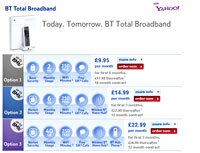 A new report has awarded the honours to BT, Virgin, Demon, AOL and Orange as being the UK’s top five consumer ADSL broadband services throughout the second quarter of 2006.
A new report has awarded the honours to BT, Virgin, Demon, AOL and Orange as being the UK’s top five consumer ADSL broadband services throughout the second quarter of 2006.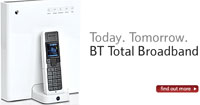 Gavin Johns, Managing Director of Epitiro said, “Our consumer ADSL testing found that in terms of Internet performance, BT topped the overall rankings for the period April to June 2006. BT was also found to provide the fastest service as a percentage of its theoretical maximum.”
Gavin Johns, Managing Director of Epitiro said, “Our consumer ADSL testing found that in terms of Internet performance, BT topped the overall rankings for the period April to June 2006. BT was also found to provide the fastest service as a percentage of its theoretical maximum.”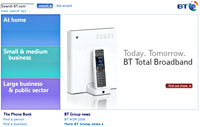 1 BT 2.78
1 BT 2.78 The US Democratic party has adopted net-neutrality as a party-political issue following the rejection of a second pro-neutrality amendment in a vote late last week.
The US Democratic party has adopted net-neutrality as a party-political issue following the rejection of a second pro-neutrality amendment in a vote late last week.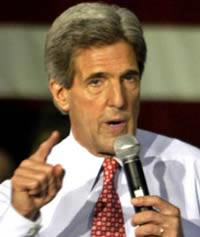 Former presidential candidate Senator John Kerry commented, “This vote was a gift to cable and telephone companies, and a slap in the face of every Internet user and consumer.” Another Democrat, Senator Ron Wyden, placed a ‘hold’ on the bill which temporarily stops further progress but a decision is inevitable and both sides are marshaling forces behind their cause.
Former presidential candidate Senator John Kerry commented, “This vote was a gift to cable and telephone companies, and a slap in the face of every Internet user and consumer.” Another Democrat, Senator Ron Wyden, placed a ‘hold’ on the bill which temporarily stops further progress but a decision is inevitable and both sides are marshaling forces behind their cause.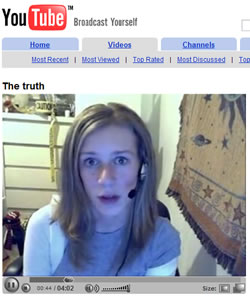 OK, you’re used to us breaking news here, but here’s one that slipped through without us noticing. We think it’s sufficiently important for us to swallow our pride and report it anyway.
OK, you’re used to us breaking news here, but here’s one that slipped through without us noticing. We think it’s sufficiently important for us to swallow our pride and report it anyway. Imagine a world where Internet performance is controlled by the company who owns the cables and where speed is sold to the highest bidder. Imagine a world where some Web sites load faster than others, where some sites aren’t even visible and where search engines pay a tax to make sure their services perform at an acceptable speed. That’s the world US Telecommunications companies (telcos) such as AT&T, Verizon, Comcast and Time Warner are trying to create.
Imagine a world where Internet performance is controlled by the company who owns the cables and where speed is sold to the highest bidder. Imagine a world where some Web sites load faster than others, where some sites aren’t even visible and where search engines pay a tax to make sure their services perform at an acceptable speed. That’s the world US Telecommunications companies (telcos) such as AT&T, Verizon, Comcast and Time Warner are trying to create. When it comes to World Cup football Web coverage in the UK, the BBC isn’t just dribbling past its rivals – it’s positively crushing past them, according to figures released by Nielsen NetRatings.
When it comes to World Cup football Web coverage in the UK, the BBC isn’t just dribbling past its rivals – it’s positively crushing past them, according to figures released by Nielsen NetRatings.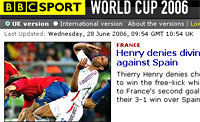 Interestingly, the Sporting Life site proved the ‘stickiest’ with punters spending the longest time on the site (an average of 36 mins each).
Interestingly, the Sporting Life site proved the ‘stickiest’ with punters spending the longest time on the site (an average of 36 mins each).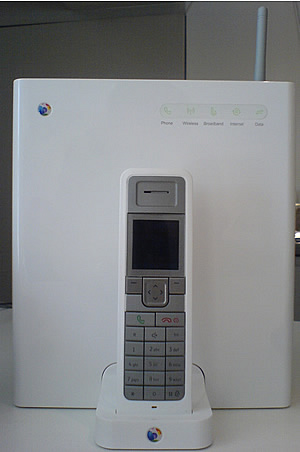 To date, most ADSL equipment that BT has put out has been pretty …. functional … or put another way, ugly. Their ethernet routers have been transposed from office equipment, and their USB kit, the Frog as it was known … well don’t get us started on that*.
To date, most ADSL equipment that BT has put out has been pretty …. functional … or put another way, ugly. Their ethernet routers have been transposed from office equipment, and their USB kit, the Frog as it was known … well don’t get us started on that*.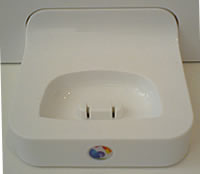 BT have clearly had the industrial designers on the case and what they’ve turned out is a bit of a looker.
BT have clearly had the industrial designers on the case and what they’ve turned out is a bit of a looker.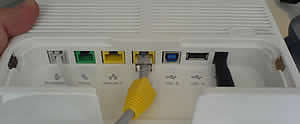 What can you connect to it?
What can you connect to it? The only issue we raised after spending a brief time with it was the usage indicator lights that sit at the top of the unit, which flicker whenever data passes through the box. Sadly, as yet, these can’t be turned off.
The only issue we raised after spending a brief time with it was the usage indicator lights that sit at the top of the unit, which flicker whenever data passes through the box. Sadly, as yet, these can’t be turned off.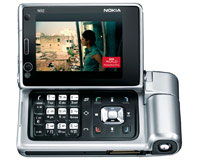 Nokia has announced a partnership with TeliaSonera Sweden to trial a complete DVB-H system, using Nokia’s Nordic know-how, their Mobile Broadcast System 3.0 and Nokia N92 mobile TV devices.
Nokia has announced a partnership with TeliaSonera Sweden to trial a complete DVB-H system, using Nokia’s Nordic know-how, their Mobile Broadcast System 3.0 and Nokia N92 mobile TV devices.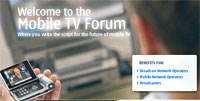 “Nokia is very pleased to be working so closely with TeliaSonera Sweden in this new area of DVB-H based mobile TV. We believe strongly in the capability of this technology as well as in the mobile TV service, and we are looking forward to verify the full potential of mobile TV together with TeliaSonera Sweden,” purred Jan Lindgren, Vice President, Networks, Nokia.
“Nokia is very pleased to be working so closely with TeliaSonera Sweden in this new area of DVB-H based mobile TV. We believe strongly in the capability of this technology as well as in the mobile TV service, and we are looking forward to verify the full potential of mobile TV together with TeliaSonera Sweden,” purred Jan Lindgren, Vice President, Networks, Nokia.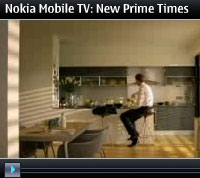 About the technology
About the technology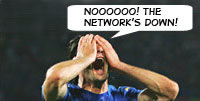 Auntie Beeb has been very nice and decided to make all of the World Cup matches it broadcasts simultaneously available through the wonderful Interweb thang.
Auntie Beeb has been very nice and decided to make all of the World Cup matches it broadcasts simultaneously available through the wonderful Interweb thang.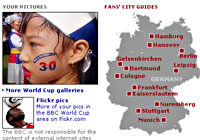 Many companies will be using broadband, which is mainly ADSL (Asymmetric Digital Subscriber Line), meaning more bandwidth down to the company than from the company to their ISP. Great for streaming, but without clever equipment, those streams will even stop upstream traffic working properly. It’s entirely feasible that all the companies bandwidth will be hogged by employees streaming.
Many companies will be using broadband, which is mainly ADSL (Asymmetric Digital Subscriber Line), meaning more bandwidth down to the company than from the company to their ISP. Great for streaming, but without clever equipment, those streams will even stop upstream traffic working properly. It’s entirely feasible that all the companies bandwidth will be hogged by employees streaming.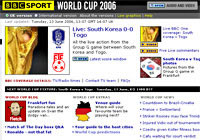 Are there any exceptions?
Are there any exceptions? Legally, a TV licence is required for any device that is “installed or used” for receiving television broadcasts, so that a networked PC used for streaming games needs a licence as well as the gogglebox at home.
Legally, a TV licence is required for any device that is “installed or used” for receiving television broadcasts, so that a networked PC used for streaming games needs a licence as well as the gogglebox at home.